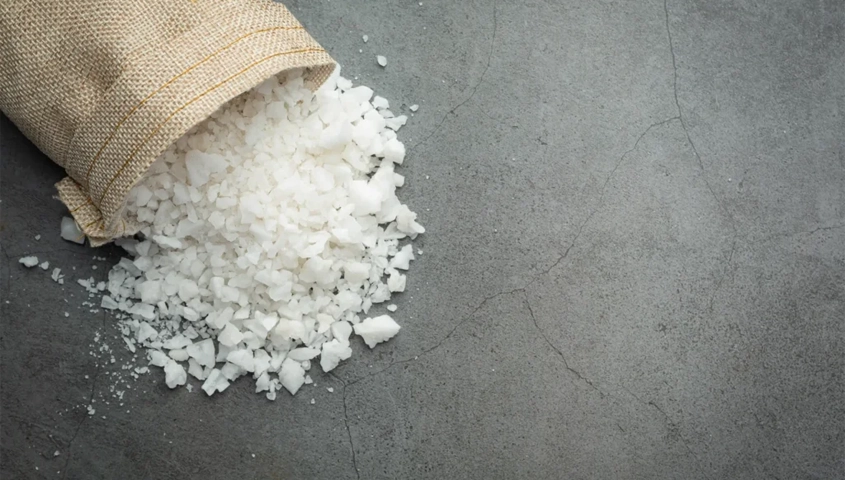Supplier of Aluminum Sulfate from Turkey and Dubai-UAE

Aluminum Sulfate Description and Properties
Aluminum Sulfate (Al₂(SO₄)₃) is a white crystalline inorganic compound widely used for its excellent coagulating, purifying, and acidifying properties. Known for its high solubility in water and stable chemical nature, it is a key material in water purification, paper manufacturing, agriculture, and many industrial processes.
Its ability to neutralize impurities and bind particles makes it one of the most versatile and valuable compounds in the chemical industry.
Physical and Chemical Properties of Aluminum Sulfate
-
Appearance: White crystalline solid (anhydrous) or colorless liquid (aqueous).
-
Odor: Odorless.
-
Taste: Mildly astringent and slightly sweet.
-
Density:
-
2.67 g/cm³ (anhydrous)
-
1.62 g/cm³ (octadecahydrate)
-
-
Melting Point:
-
770 °C (anhydrous, decomposes)
-
86.5 °C (octadecahydrate)
-
-
Solubility: Readily soluble in water, slightly soluble in alcohol.
-
Hygroscopic Nature: Absorbs moisture from the air.
-
Chemical Formula: Al₂(SO₄)₃
-
Molar Mass: 342.15 g/mol (anhydrous)
-
pH (1% Solution): 2.5–3.5
-
Reactivity: Non-combustible, forms acidic solutions, and reacts with bases to produce aluminum hydroxide.
Applications of Aluminum Sulfate
Aluminum Sulfate is a highly versatile chemical used across many industries due to its coagulating, acidifying, and stabilizing properties. Its ability to purify, bind, and regulate pH makes it essential in sectors such as water treatment, paper manufacturing, agriculture, food processing, textiles, and construction.
1. Water and Wastewater Treatment
Aluminum Sulfate is one of the most widely used coagulants in municipal and industrial water treatment facilities.
-
Coagulation and Flocculation: It helps remove suspended solids and organic impurities from raw water, forming flocs that can be easily filtered out.
-
Phosphate Control: Reduces phosphorus levels in wastewater, preventing algae blooms and protecting aquatic ecosystems.
-
pH Adjustment: Stabilizes alkaline water by neutralizing excess alkalinity, extending the lifespan of pipelines and treatment equipment.
Its efficiency, availability, and cost-effectiveness make aluminum sulfate a preferred choice in global water purification systems.
2. Paper Manufacturing
In the paper industry, Aluminum Sulfate is a key ingredient in achieving consistent quality and performance.
-
Sizing Agent: Improves paper strength, ink adhesion, and moisture resistance.
-
Retention Aid: Helps retain fillers and fibers during sheet formation, reducing waste and improving production efficiency.
-
pH Control: Ensures optimal acidity in the pulp process, enhancing paper finish and color uniformity.
By stabilizing the papermaking process, aluminum sulfate helps manufacturers achieve smooth, durable, and high-quality paper products.
3. Agriculture and Soil Management
Aluminum Sulfate enhances soil performance and supports healthier crop growth.
-
Soil Conditioner: Lowers soil pH for acid-loving plants like blueberries, hydrangeas, and azaleas.
-
Nutrient Source: Supplies sulfur and aluminum, which contribute to stronger root systems and improved crop yield.
-
Soil pH Optimization: In agriculture, it can be used together with Caustic Soda Flakes to balance soil acidity and alkalinity, ensuring long-term soil fertility and better nutrient uptake.
The combined use of Aluminum Sulfate and Caustic Soda Flakes offers a sustainable solution for farmers aiming to maintain soil balance and productivity.
4. Food and Beverage Industry
In food processing, Aluminum Sulfate is recognized for its role as a stabilizer and acidity regulator.
-
Pickling Agent: Helps maintain firmness and crispness in canned vegetables and fruits.
-
Leavening Agent: Acts as an acidity regulator in commercial baking powders, ensuring consistent dough rise and texture.
-
Preservative Role: Contributes to food stability and shelf-life by maintaining proper pH levels during production.
All food-grade aluminum sulfate complies with international safety standards, making it suitable for regulated food applications.
5. Textile and Leather Industry
Aluminum Sulfate is widely used in the textile and leather sectors for dyeing and tanning processes.
-
Mordant in Dyeing: Binds dyes to natural and synthetic fibers, producing bright, durable, and wash-fast colors.
-
Leather Tanning Agent: Helps stabilize collagen fibers, resulting in soft, strong, and flexible leather.
-
Color Uniformity: Enhances dye penetration, ensuring consistent shades across large fabric batches.
Its versatility and compatibility with various dye systems make it a reliable choice for textile manufacturers worldwide.
6. Construction and Fire Protection
In the construction and safety sectors, Aluminum Sulfate contributes to performance and protection.
-
Concrete Accelerator: Reduces setting time during cold-weather construction, improving work efficiency.
-
Fire Retardant: Used in fire-resistant coatings, foams, and building materials to reduce flame spread and smoke generation.
-
Binder Component: Strengthens industrial cements and specialized plasters used in infrastructure projects.
These applications highlight the adaptability of aluminum sulfate as a multifunctional additive in construction chemistry.
Handling, Storage, and Transportation
Proper handling and storage practices are essential to maintain product quality and ensure safety.
-
Always wear protective gloves, goggles, and clothing.
-
Avoid dust inhalation and work in well-ventilated areas.
-
In case of contact, rinse immediately with water.
-
Store in a cool, dry, and well-ventilated environment, away from moisture.
-
Always check the Safety Data Sheet (SDS) for detailed handling and disposal information.
Packaging Details of Aluminum Sulfate
Aluminum sulfate is available in a variety of packaging options to meet industrial, agricultural, and commercial requirements.
-
25 kg and 50 kg woven polypropylene (WPP) bags with moisture-proof liners.
-
1 MT jumbo bags for bulk transport and large-scale industrial use.
-
All packages are clearly labeled with product name, chemical formula, batch number, and safety information.
Container Loading
Aluminum sulfate is loaded into containers based on packaging:
-
25–50 kg bags: 20-ft container ≈ 18–20 tons, 40-ft container ≈ 22–25 tons.
-
1 MT jumbo bags: 20-ft ≈ 18–20 tons, 40-ft ≈ 22–25 tons.
Bags and drums should be stacked securely and palletized to prevent shifting and moisture damage during transport.
Technical Data Sheet of Aluminum Sulfate
| Property | Specification |
|---|---|
| Chemical Formula | Al₂(SO₄)₃ |
| Molecular Weight | 342.15 g/mol |
| Appearance | White to off-white powder or granular solid |
| Purity | ≥ 17% Al₂O₃ content |
| pH (1% solution) | 3.0 – 3.5 |
| Insoluble Matter | ≤ 0.1% |
| Iron Content (Fe) | ≤ 0.01% |
| Density | 2.7 – 2.9 g/cm³ |


